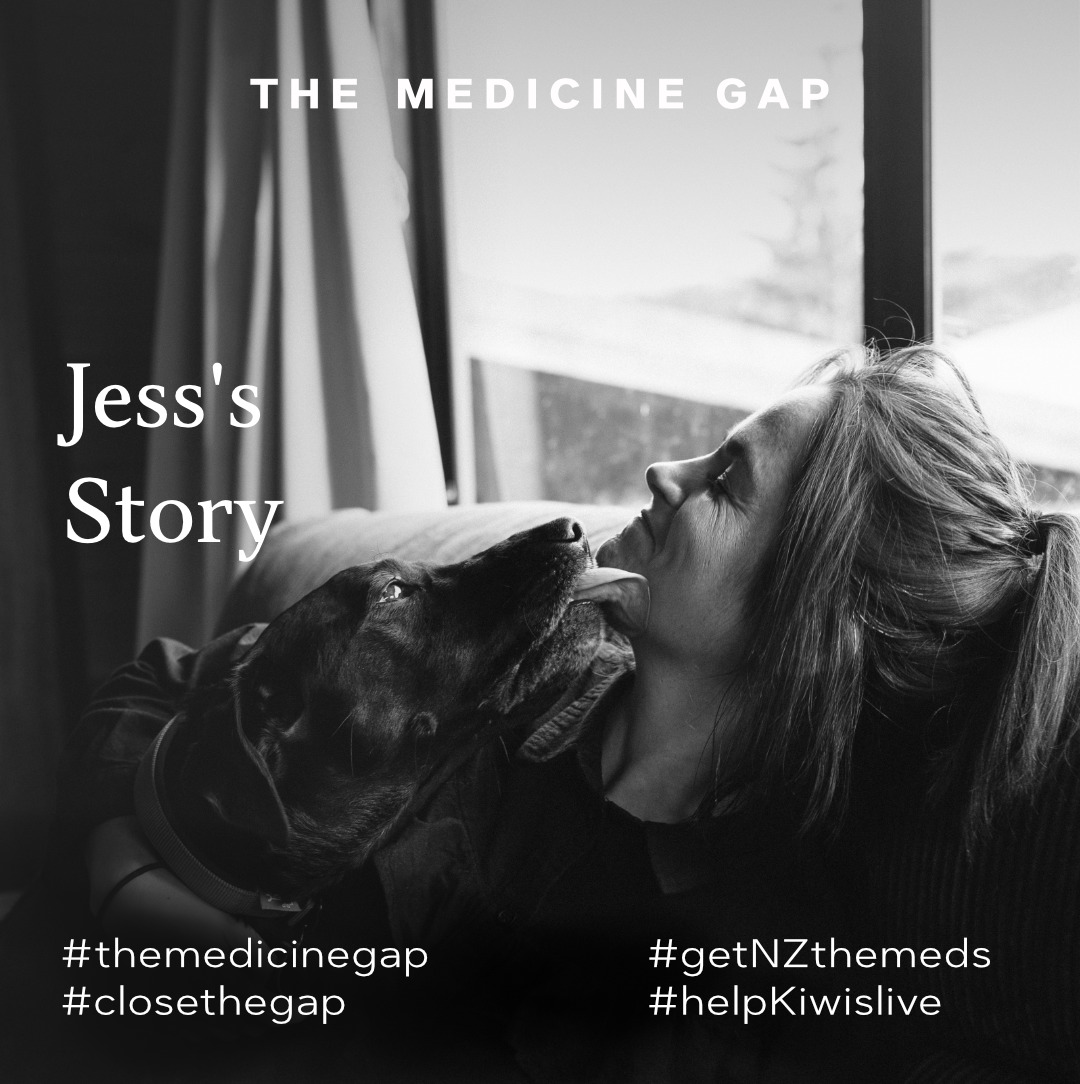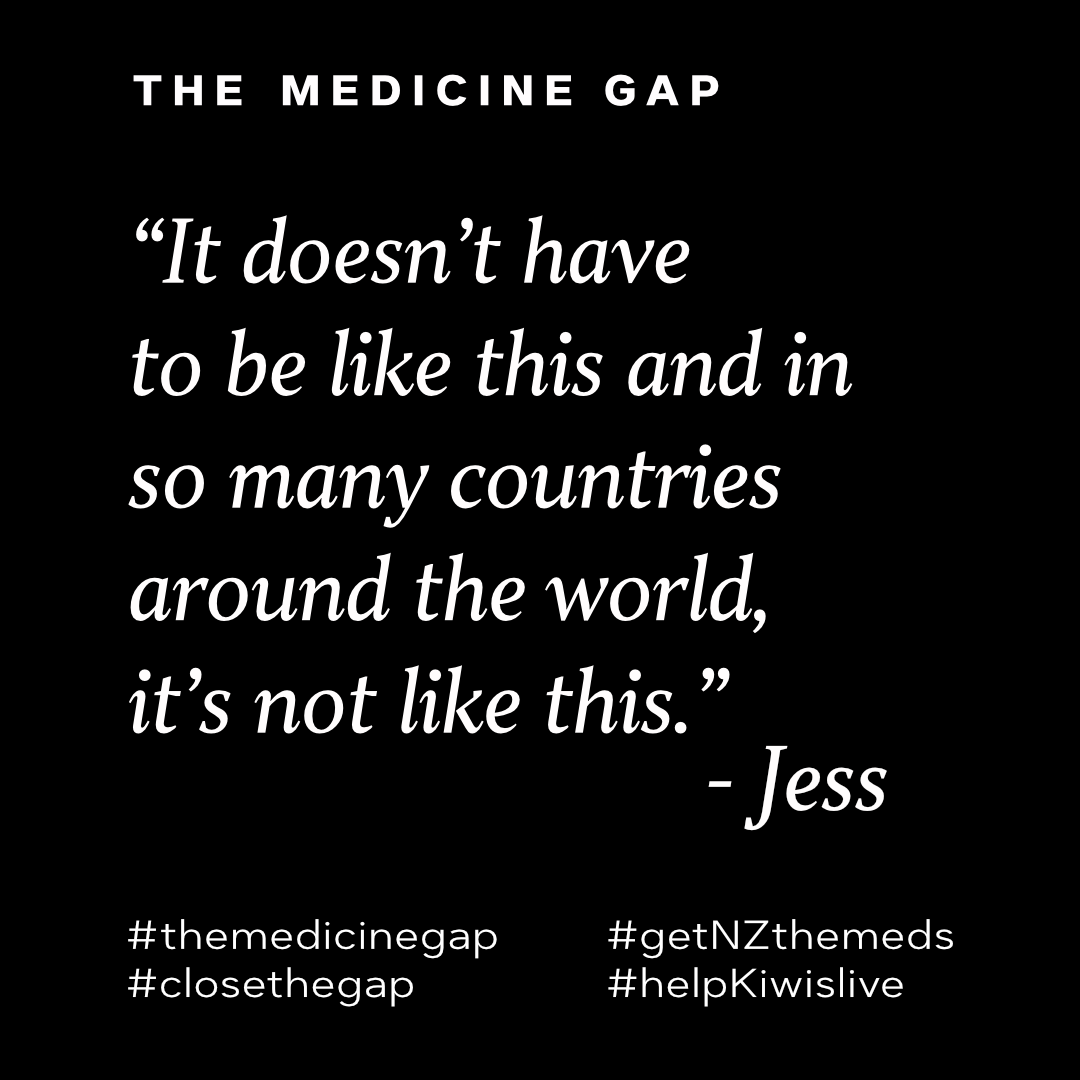
For much of the day, Jess is alone.
It wasn’t always like this. She used to be a flight attendant for Qantas, warmly greeting passengers, reassuring nervous fliers, and making everyone feel safe and comfortable. But that was a long time ago now. Her light-filled smile and warm, engaging eyes hide her fatigue but make no mistake, Jess is tired. So very, very tired.
“I was 14 when it began. One day I just couldn’t stand up. I was in Science and a stabbing pain started radiating across my body and I couldn’t move.”
It took seven years to diagnose Jess with Crohn’s disease. Every time she went to a doctor, she was told she had Irritable Bowel Syndrome or IBS. Then, when she was 21 and after repeated trips to the doctor, Jess says they agreed to perform a colonoscopy to “ease my anxiety”.
“That’s when they discovered I had Crohn’s. It was severe, but at least I could finally prove that it wasn’t in my mind.”

New Zealand has one of the highest rates of Crohn’s disease and ulcerative colitis in the world.
More than 20,000 Kiwis suffer from these life-disrupting, debilitating conditions that trigger a level of suffering and social isolation that few of us, fortunately, will ever experience.
Jess has Crohn’s, an inflammatory bowel disease that causes swelling, thickening and inflammation in the gastrointestinal track. It attacks the large and small intestines which become red, swollen, and ulcerated. It causes excruciating abdominal pain, bloody or watery diarrhoea, and fistulae often form which are small tunnels that develop around the anus as the body tries to drain blood, pus, and stool from the inflamed or infected area.
“I used to be embarrassed but I think it’s really important that people understand what some of us are living with in New Zealand. There are drugs that can help Kiwis. It doesn’t have to be like this and in so many countries around the world, it’s not like this.”
Crohn’s is usually diagnosed in young New Zealanders; adolescents, and men and women aged between 20 and 30. There are new, modern medicines, commonly available right across the developed world to treat the most severe form of the disease, but they are not funded in New Zealand.
If you are looking for a Poster Child for New Zealand’s unfunded medicines crisis, Jess could easily fit the bill. Her life, tragically, has been defined by a treatable, chronic disease that despite years of pleas, petitions and intervention from gastroenterologists, New Zealand’s health system has simply refused to fund a drug to treat her.
“If it wasn’t for my dog, Max….I’m not sure I’d be here,” Jess says.

Jess’s desperation is echoed by Dr Malcolm Arnold, the former President of the New Zealand Society of Gastroenterology. The Society recently surveyed its membership revealing a deep sense of desperation and anger among doctors treating patients with severe Crohn’s and colitis. Some described the lack of access to treatments as “next to criminal”.
Last year, in a petition to Parliament that was backed by 200 health professionals, Dr Arnold said “the tragedy is severe Crohn’s and colitis can be treated, giving patients the possibility of normal, productive and fulfilling lives. Instead, we’re condemning them to suffer in silence, with a life of chronic pain and potentially life-altering surgery with profoundly isolating social and psychological impacts. For us, as medical professionals, this situation is deeply distressing.”
The breakthrough in the treatment of Crohn’s began two decades ago.
Biotechnicians developed a range of drugs manufactured from either living micro-organisms, plants or animal cells, called ‘biologics’. Two anti-inflammatory biologics came on the market, Humira and Remicade, but New Zealanders waited almost a decade for Pharmac to fund them.
They are an effective medication for an estimated 50%-60% of people with severe Crohn’s disease but within five years, half will develop a resistance and the drugs will stop working.
There is another option. In 2016, America’s Food and Drug Administration approved a biologic called Stelara which uses a different treatment mechanism and can put Crohn’s into remission. The Australians funded it within 12 months. In New Zealand, we haven’t funded Stelara, or any new medication to treat Crohn’s for a staggering 12 years.
The only option open to people with severe Crohn’s disease who don’t respond to the older medicines is surgery. That means, in most cases, removing chunks of the digestive system including portions of the small intestine like the rectum and colon.

Jess has fought this brutal disease for almost two decades of her life. It has shaped her very existence.
Ten years ago, she had a temporary ileostomy. Her small intestine was diverted through an opening in her abdomen into a stoma bag, to try and relieve what her gastroenterologist described as “the worst perianal disease” he had ever seen. Perianal disease is a horrific by-product of severe Crohn’s and affects the area between the anus, and the testicles or vagina.
“There was a period there, for about two years, where I was admitted to hospital every month for emergency surgery. I was just so sick.”
The temporary ileostomy was reversed when her perianal disease improved, and her surgeon reattached her intestine to her bowel. Two years later, when she fell gravely ill again, the surgeon performed a second ileostomy.
Jess has lost count of the number of surgeries she’s had but knows it’s “more than 35”.
“My body just shuts down. I can barely eat. I can’t retain any food or any nutrients. I get really thin, and I am either in the bath trying to ease some of the pain in the warm water, or I’m on the loo with diarrhoea. Sometimes I spend the day lying on the bathroom floor.”
“I can’t explain the impact on your mental health. It is massive. The physical and mental fatigue. Your body is always fighting.”
The other consideration, if you put to one side the inhumanity of Jess’s existence, is the cost. If Jess had moved onto ‘Stelara’ when it became available, the likely cost to our health system and the taxpayer would have been significantly less. However, when it comes to funding pharmaceuticals, consideration is rarely given to the downstream costs of not funding a drug.

Medsafe, New Zealand’s drug regulator, approved Stelara for use in New Zealand in 2018 however Stelara still languishes on Pharmac’s list of unfunded medicines alongside another 100 or so modern medicines.
It’s estimated the negotiated cost to Pharmac, our drug-buying agency, will be around $20-$24k a year and gastroenterologists believe the number of New Zealanders who need Stelara is “in the hundreds, not thousands”.
Last year, the drug company which manufactures Stelara stepped in to compassionately fund Jess. Her health has improved, but the drug can’t reverse the severe damage already inflicted on Jess’s colon.
“It was too late, sadly. My Crohn’s, without treatment, has just caused too much damage.”
In July, she had a proctocolectomy and 20cm of her small intestine removed. In layman’s terms, that means her colon and rectum were surgically removed, and what is left of her small intestine is brought through her abdominal wall to empty waste into a stoma bag.

Jess says she’s doing okay but “okay” is a relative term for Jess. She developed a blockage in her system soon after surgery and began vomiting secretions from her stomach. She had a nasal gastric tube inserted to drain her stomach, and a catheter was inserted through her stoma bag to syringe liquid from her body.
She’s out of hospital but the skin around her stoma is burnt from seeping intestinal fluids and waste, and now it’s bleeding.

“It’s like putting the palm of your hand on a hot element and then pouring lemon juice on the burn. That’s what my ileostomy feels like every day.”
The road ahead is long for Jess. Her inability to access a modern medicine in New Zealand has impacted her life in so many ways including career, relationships, and the option of motherhood. The list goes on.
And in all of this, there is an absence of political accountability. The Health Minister says Pharmac must be independent and left alone to decide what drugs it funds. Pharmac says it can only do what it can with the level of funding it gets from the Government. And around in circles we go. Pharmac, our drug-buying agency, has been underfunded for years by successive governments and the human cost has been catastrophic.

New Zealanders like Jess get caught in the middle and are left lying on the bathroom floor in severe pain, dealing with pus-filled abscesses, re-sectioned intestines, and facing another trip to the A&E. It’s difficult to understand how this can happen in a wealthy, developed First World economy like New Zealand.
Despite everything this horrible disease has thrown at Jess, she continues to search for ‘the good’. She is a kind and intelligent woman and, if her health allowed, there is little doubt this young woman could pursue a career that would bring a richness to any organisation.
I ask Jess how Crohn’s has impacted her life and for the first time her smile disappears, the bravery evaporates, and she tries to stifle her tears.
“I have no self-worth. None at all. What do I contribute to New Zealand? I want to be part of society. I want to live my life. What do you do if you have no self-worth? If you have no value?”
It is difficult to leave Jess. She smiles and waves us off, her ever-faithful Labrador, Max, by her side.
But Jess is alone again.
Jess and many other people in the prime of their lives remain isolated in a country that will not fund a drug that almost every other developed nation in the world has embraced.


Show your support.
Share Jess’s story.
New Zealand needs access now to modern medicines to treat Crohn’s Disease.




Other Voices
Let’s close the Gap
Get Involved1.
REFORM
PHARMAC
Achieve a measurable, political commitment to reform Pharmac and create a fit-for-purpose drug-buying agency that supports and enables greatly improved access to modern medicines – and ensure a direct line of political accountability.
2.
OVERHAUL THE FUNDING
METHODOLOGY
Introduce a globally accepted modern, cost-benefit analysis for medicines and medical devices which looks at the ‘value’ of a medicine, and considers the financial, economic, and social impact of untreated disease on our society.
3.
COMMIT TO AN OUTCOMES-BASED MEDICAL STRATEGY
Develop a Medicines Strategy to guide the decision-making process, create measurable targets to reduce Pharmac’s waiting list, and detail how the agency will respond to rapid developments in modern medicine to improve health outcomes for New Zealanders.